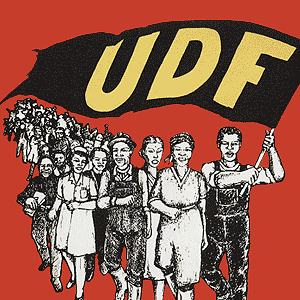An arm is an upper limb of the body.

The National Party, also known as the Nationalist Party, was a political party in South Africa from 1914 to 1997, which was responsible for the implementation of apartheid rule. The party was an Afrikaner ethnic nationalist party, which initially promoted the interests of Afrikaners but later became a stalwart promoter and enactor of white supremacy, for which it is best known. It first became the governing party of the country in 1924. It merged with its rival, the SAP, during the Great Depression, and a splinter faction became the official opposition during World War II and returned to power. With the National Party governing South Africa from 4 June 1948 until 9 May 1994, the country for the bulk of this time was only a de jure or partial democracy, as from 1958 onwards non-white people were barred from voting. In 1990, it began to style itself as simply a South African civic nationalist party, and after the fall of apartheid in 1994, attempted to become a moderate conservative one. The party's reputation was damaged irreparably by perpetrating apartheid, and it rebranded itself as the New National Party in 1997 before eventually dissolving in 2005.

The Revolutionary Communist Group (RCG) is a communist, Marxist and Leninist political organisation in the United Kingdom.
United Nations General Assembly Resolution 1761 was passed on 6 November 1962 in response to the racist policies of apartheid established by the South African Government.

Helen Suzman, OMSG, DBE was a South African anti-apartheid activist and politician. She represented a series of liberal and centre-left opposition parties during her 36-year tenure in the whites-only, National Party-controlled House of Assembly of South Africa at the height of apartheid.
The Anti-Apartheid Movement (AAM) was a British organisation that was at the centre of the international movement opposing the South African apartheid system and supporting South Africa's non-White population who were persecuted by the policies of apartheid. The AAM changed its name to ACTSA: Action for Southern Africa in 1994, when South Africa achieved majority rule through free and fair elections, in which all races could vote.
In South Africa under apartheid, and South West Africa, pass laws served as an internal passport system designed to racially segregate the population, restrict movement of individuals, and allocate low-wage migrant labor. Also known as the natives' law, these laws severely restricted the movements of Black South African and other racial groups by confining them to designated areas. Initially applied to African men, attempts to enforce pass laws on women in the 1910s and 1950s sparked significant protests. Pass laws remained a key aspect of the country's apartheid system until their effective termination in 1986. The pass document used to enforce these laws was derogatorily referred to as the dompas.

Apartheid was a system of institutionalised racial segregation that existed in South Africa and South West Africa from 1948 to the early 1990s. Apartheid was characterised by an authoritarian political culture based on baasskap, which ensured that South Africa was dominated politically, socially, and economically by the nation's dominant minority white population. In this minoritarian system, there was social stratification, where white citizens had the highest status, followed by Indians and Coloureds, then Black Africans. The economic legacy and social effects of apartheid continue to the present day, particularly inequality.

The United Democratic Front (UDF) was a South African popular front that existed from 1983 to 1991. The UDF comprised more than 400 public organizations including trade unions, students' unions, women's and parachurch organizations. The UDF's goal was to establish a "non-racial, united South Africa in which segregation is abolished and in which society is freed from institutional and systematic racism." Its slogan was "UDF Unites, Apartheid Divides." The Front was established in 1983 to oppose the introduction of the Tricameral Parliament by the white-dominated National Party government, and dissolved in 1991 during the early stages of the transition to democracy.
Anti-apartheid may refer to any opposition to apartheid, the 1948–94 racial policy of the South African government; in particular:
The academic boycott of South Africa comprised a series of boycotts of South African academic institutions and scholars initiated in the 1960s, at the request of the African National Congress, with the goal of using such international pressure to force the end to South Africa's system of apartheid. The boycotts were part of a larger international campaign of "isolation" that eventually included political, economic, cultural and sports boycotts. The academic boycotts ended in 1990, when its stated goal of ending apartheid was achieved.
Black consciousness may refer to:

Disinvestmentfrom South Africa was first advocated in the 1960s in protest against South Africa's system of apartheid, but was not implemented on a significant scale until the mid-1980s. A disinvestment policy the US adopted in 1986 in response to the disinvestment campaign is credited with playing a role in pressuring the South African government to embark on negotiations that ultimately led to the dismantling of the apartheid system.

Israeli Apartheid Week (IAW) is an annual series of university lectures and rallies held in February or March. According to the organization, "the aim of IAW is to educate people about the nature of Israel as an apartheid system and to build Boycott, Divestment and Sanctions (BDS) campaigns as part of a growing global BDS movement." Since IAW began in Toronto in 2005, it has spread to at least 55 cities, including locations in Australia, Austria, Brazil, Botswana, Canada, France, Germany, India, Italy, Japan, Jordan, South Korea, Malaysia, Mexico, Norway, Palestine, South Africa, the United Kingdom, and the United States.

Internal resistance to apartheid in South Africa originated from several independent sectors of South African society and took forms ranging from social movements and passive resistance to guerrilla warfare. Mass action against the ruling National Party (NP) government, coupled with South Africa's growing international isolation and economic sanctions, were instrumental in leading to negotiations to end apartheid, which began formally in 1990 and ended with South Africa's first multiracial elections under a universal franchise in 1994.
Have You Heard from Johannesburg is a series of seven documentary films, with a total runtime of 8.5 hours, covering the 45-year struggle of the global anti-apartheid movement against South Africa's apartheid system and its international supporters who considered them an ally in the Cold War. The combined films have an epic scope, spanning most of the globe over half a century. Beginning with the very first session of the United Nations, and ending in 1990 – when, after 27 years in prison, Nelson Mandela, the best known leader of the African National Congress toured the world, a free man. Produced and directed by Connie Field, it includes other events such as the Sharpeville massacre, the Soweto uprising and the murder of Steve Biko. The title comes from the lyrics of the Gil Scott-Heron song "Johannesburg".

Boycott, Divestment and Sanctions (BDS) is a Palestinian-led movement promoting boycotts, divestments, and economic sanctions against Israel. Its objective is to pressure Israel to meet what the BDS movement describes as Israel's obligations under international law, defined as withdrawal from the occupied territories, removal of the separation barrier in the West Bank, full equality for Arab-Palestinian citizens of Israel, and "respecting, protecting, and promoting the rights of Palestinian refugees to return to their homes and properties". The movement is organized and coordinated by the Palestinian BDS National Committee.

The apartheid regime in South Africa began in 1948 and lasted until 1994. It involved a system of institutionalized racial segregation and white supremacy, and placed all political power in the hands of a white minority. Opposition to apartheid manifested in a variety of ways, including boycotts, non-violent protests, and armed resistance. Music played a large role in the movement against apartheid within South Africa, as well as in international opposition to apartheid. The impacts of songs opposing apartheid included raising awareness, generating support for the movement against apartheid, building unity within this movement, and "presenting an alternative vision of culture in a future democratic South Africa."

As a response to South Africa's apartheid policies, the international community adopted economic sanctions as condemnation and pressure.










